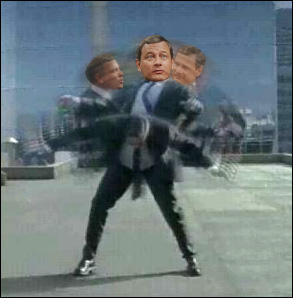Debate Thoughts
Anyway, I thought it was a great debate. It was less about Roberts than I expected it to be, but that was a good thing. Basically, the debate was about the two major Con law theories. Both of the debaters were excellent. I don't think either side could've been represented better. Not surprisingly, I agreed with Prof. McAdams.
The most interesting part of the debate (in my opinion) was the examination of the Commerce Clause by Prof. Moss. I think it's fair to say that he has a very expansive view of the Commerce Clause. He cited Lopez and the Gun-Free School Zones Act as well as Morrison and the Violence Against Women Act as examples of the Court getting it wrong, striking down valid legislation. He argued that guns in schools and violence against women obviously have an effect on commerce. After all, unsafe schools reduce the ability of students to become educated, get skills, and obtain jobs. Also, incidents of violence as well as violent areas and situations keep women from engaging in economic activities. Right?
Sure, if you think that the Commerce Clause can regulate anything. That's what this position amounts to. I can use that framework to link any human activity to commerce. Everything you do can change your economic effect on interstate commerce. Everything you do related to your ability to work productively and spend money in the free market can somewhere down the line have an effect on someone else's bottom line.
The Commerce Clause is in Article I, Section 8 of the Constitution. It is one small part of a list of enumerated powers given to the federal government by the people. If the Commerce Clause gets to regulate anything even tenuously connected to economic impact, why list the other powers? Many of them would be superfluous. How about the "To establish Post Offices and post Roads" clause? The postal system obviously has an economic impact. Why include that if the Commerce Clause could cover that anyway?
Because the Commerce Clause does not cover that. The Commerce Clause does not give Congress a blank check to regulate anything that money might be involved with. If it did, Congress could do whatever it wanted, only restricted by the limits of their imaginations. The federal government is one of limited, enumerated powers. It does not have the police power. The expansive view of the Commerce Clause is just an attempt at a federal police power.
But hey, I'll play along. What activity could I regulate under this liberalized Commerce Clause... I bet (approximately) 42 million abortions since 1973 has had an effect on interstate commerce. I'm sure all of those once potential consumers and producers would have had an effect on national economics. I'd be willing to bet the effect would be greater than that of a federal gun ban near schools. Maybe if Roe and Casey are overturned, a Republican controlled Congress would do just that. See what happens when you play fast and loose with the Constitution?

